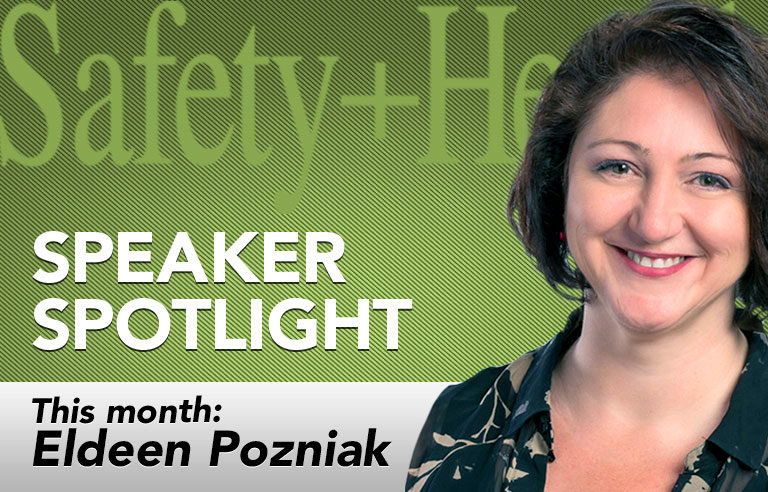Speaker Spotlight: Are we using our full intelligence?

EDITOR’S NOTE: Every year, the National Safety Council Congress & Expo features some of the top thought-leaders and motivators in the occupational safety and health community. Safety+Health has invited the most highly rated presenters to contribute to this monthly column. For more on this year’s event, visit congress.nsc.org.
When it comes to being “smart enough,” we often think only about IQ.
Intelligence is the ability to think, learn from experience, solve problems and adapt to new situations. As safety experts, we need multiple types of intelligence to do our jobs effectively.
Technical knowledge and skills serve as foundations to manage safety issues, hazards, risks and controls, and program components. But taking safety and health to the next level can’t be done with intellectual intelligence alone. We need leadership skills based on other aspects of intelligence, such as emotion and culture.
Emotional intelligence
Although intellectual intelligence typically isn’t something we can greatly change or improve, it has been proven that we can enhance other realms of intelligence, such as emotional intelligence.
A research briefing recently published in the Oxford Review, “How Managers Develop Emotional Intelligence and Apply It,” explains how having high-level emotional intelligence has many benefits, including greater leadership ability, decision-making skills and personal well-being, and less occupational stress and staff turnover. Emotional intelligence research cited in the Harvard Business Review states that five components or characteristics are at work:
Self-awareness. The critical knowledge and understanding of one’s own strengths and weaknesses, combined with the ability to receive feedback and adapt as needed.
Self-regulation. The ability to express one’s self in an authentic, respectful, tactful way without inappropriate emotional reactions.
Motivation. Based on intrinsic motivation, understanding what motivates you and others, and being driven by personal fulfillment vs. extrinsic motivators.
Empathy. The ability to understand how another person feels and experiences the world, and then responding appropriately by being curious and understanding, offering encouragement, reflecting emotions, and practicing kindness.
Social (people) skills. The ability to build rapport with and gain the trust of others.
We can strengthen certain aspects of our emotional intelligence by focusing and working on each of these components. For example, examine and take personal inventory of your strengths and weaknesses to increase self-awareness. Having emotional intelligence helps us safety professionals be more effective in leading people and managing the safety management system and initiatives. The more emotional intelligence we have, the more influential we can be as leaders.
Cultural intelligence
Similarly, the more we understand other people and their definitions of the world and safety, the stronger our empathy, self-regulation, motivation and social skills will be.
Geert Hofstede, a Dutch researcher of culture and its effects on occupational health and safety, defined “culture” as the collective mental programming of the human mind, which influences patterns of thinking and distinguishes one group of people from another.
Cultural diversity can have a positive influence in the workplace (e.g., various skills, abilities and viewpoints) and adds value by using skills from different cultural groups. However, if diversity isn’t taken into consideration and strategically dealt with, this can lead to miscommunication, ambiguity, complexity and confusion, dysfunctional adaptation behaviors, and increased risk of injury and incident.
The more information we have to help us understand the cultural preference and dimension, such as orientation toward people and relationship, orientation toward hierarchy, indirect or direct communication preference, time orientation, gender roles, personal space, and nonverbal communication, the better prepared we are to have appropriate interactions and develop our initiatives, communications and training to suit the needs of everyone.
This article represents the views of the author and should not be construed as a National Safety Council endorsement.
 Eldeen Pozniak is a Canadian-registered safety professional, certified health and safety consultant, certified health and safety management system auditor, fellow of the International Institute of Risk and Safety Management, and chartered member of the Institution of Occupational Safety and Health in the United Kingdom.
Eldeen Pozniak is a Canadian-registered safety professional, certified health and safety consultant, certified health and safety management system auditor, fellow of the International Institute of Risk and Safety Management, and chartered member of the Institution of Occupational Safety and Health in the United Kingdom.
Direct to your inbox: Sign up to be notified in email about new “Speaker Spotlight” columns.
Post a comment to this article
Safety+Health welcomes comments that promote respectful dialogue. Please stay on topic. Comments that contain personal attacks, profanity or abusive language – or those aggressively promoting products or services – will be removed. We reserve the right to determine which comments violate our comment policy. (Anonymous comments are welcome; merely skip the “name” field in the comment box. An email address is required but will not be included with your comment.)

